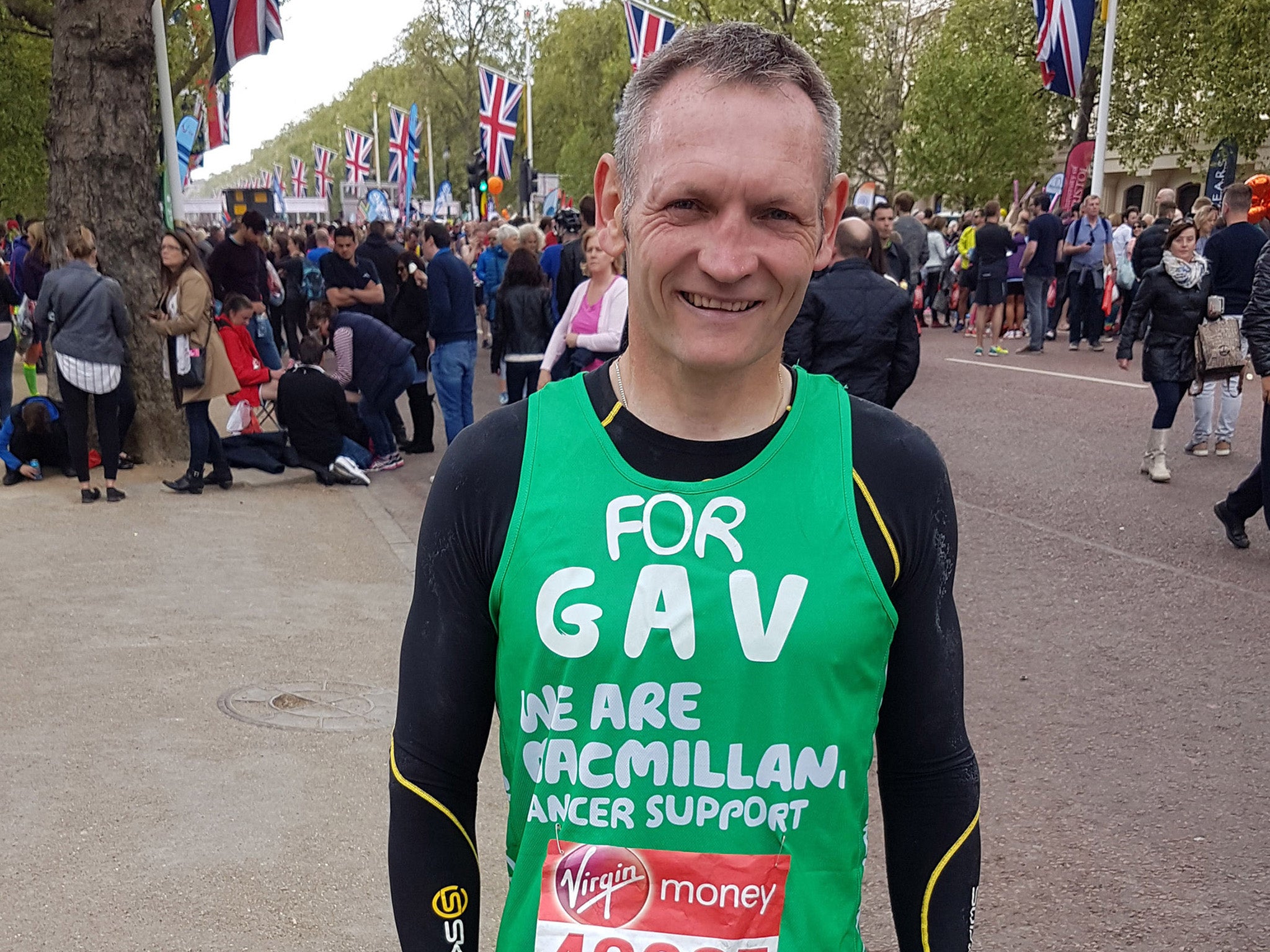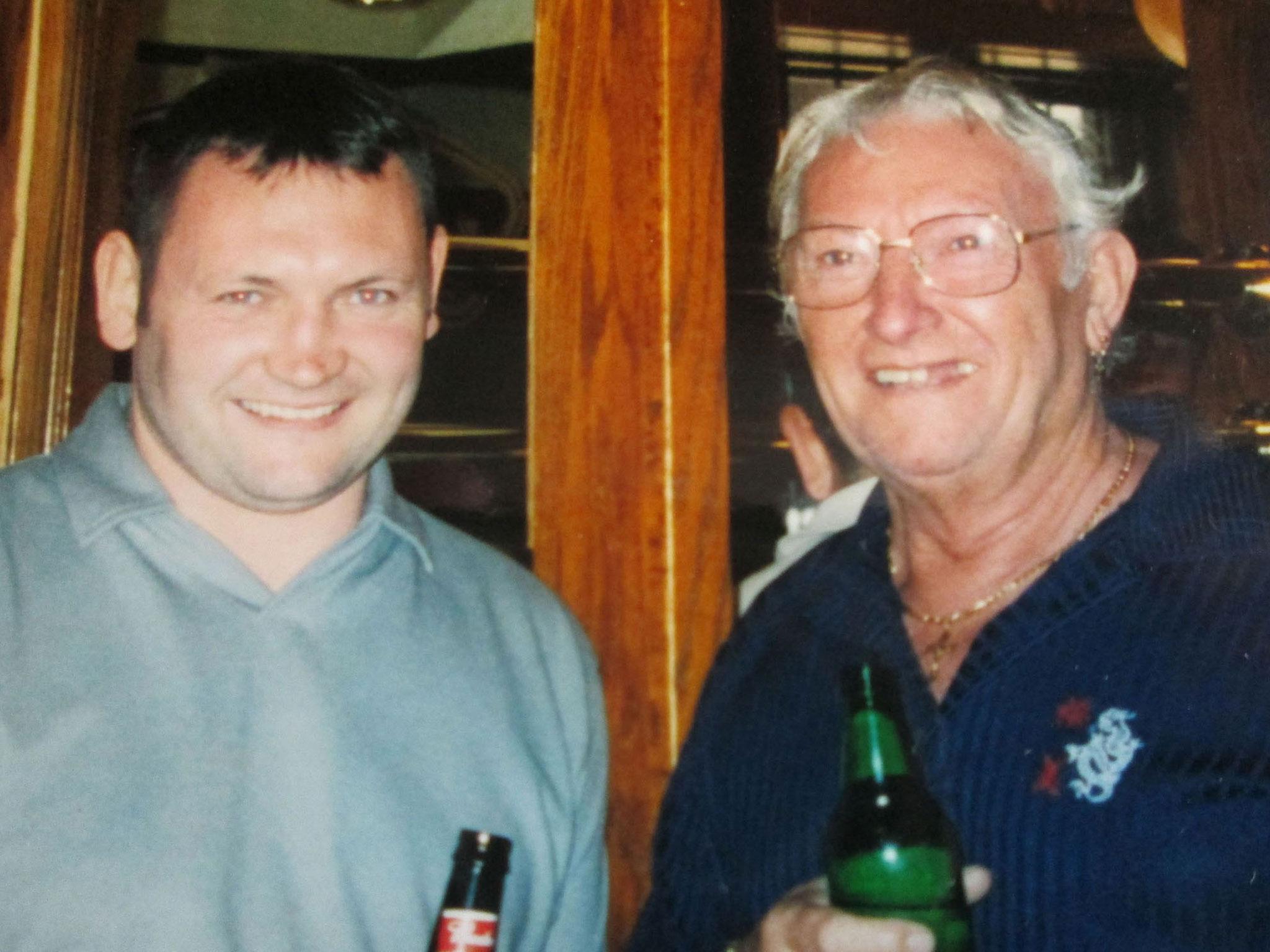London Marathon 2017: meet Gary McKee, the man running 100 marathons in 100 days
He finishes his centurion effort today as he competes in the capital’s annual run

Your support helps us to tell the story
From reproductive rights to climate change to Big Tech, The Independent is on the ground when the story is developing. Whether it's investigating the financials of Elon Musk's pro-Trump PAC or producing our latest documentary, 'The A Word', which shines a light on the American women fighting for reproductive rights, we know how important it is to parse out the facts from the messaging.
At such a critical moment in US history, we need reporters on the ground. Your donation allows us to keep sending journalists to speak to both sides of the story.
The Independent is trusted by Americans across the entire political spectrum. And unlike many other quality news outlets, we choose not to lock Americans out of our reporting and analysis with paywalls. We believe quality journalism should be available to everyone, paid for by those who can afford it.
Your support makes all the difference.“If you want to enjoy something, run 100 metres. If you want to experience something, run a marathon.“ The words of Emil Zátopek have been endlessly quoted by distance runners since the great Czechoslovak won Olympic gold in his first attempt at the distance in 1952. But Gary McKee, a beer-loving 47-year-old from Cleator Moor in Cumbria, had a better idea. He ran 100 marathons – on 100 successive days.
He fitted the first 98 around his busy schedule as a father-of-three and shift team leader at Sellafield: usually before work but occasionally afterwards, on a straight out-and-back route, logged on the running social network Strava, from his home. He did the 99th in London yesterday, round and round Hyde Park for 26.2 miles. And for the 100th he chose the Virgin Money London Marathon itself.
Why? Gary's life changed two decades ago when his father was diagnosed with cancer. “There’s someone you thought would always be there, and then suddenly your world falls apart.”
Nurses from Macmillan Cancer Support became a cherished part of the McKee family during that dark time.
After six traumatic years, Gary’s father died from an unrelated illness. Ever since, Gary has been honouring his father’s memory, and expressing his gratitude to those who helped the family to care for him, by running absurd distances to raise money for Macmillan.
In the context of the London Marathon, that particular aspect of the story is strangely unremarkable. We have all heard similar tales. That’s the miracle of a sport through which hundreds of thousands of ordinary people have pushed themselves to athletic lengths they would once have considered impossible in order to support causes that, for their own special reasons, they are prepared to go through agonies to support. Each story is unique, and few are not moving or inspiring. Yet because they are so numerous they are rarely newsworthy.

But Gary has taken his altruistically motivated exertions to extremes that even the most jaded observer of marathon fundraising might gasp at. It’s not just that he’s climbed Kilimanjaro, trekked 800 miles through Brazil, walked over hot coals: quite a few people do that sort of thing these days. But I shouldn’t think many people have run all the way from Cumbria to London – as Gary did two years ago – in order to compete in the capital’s big race. And I’m certain that Gary is the first person to have run the race as his 100th marathon in 100 successive days. (If you’ve ever run a marathon, just pause for a second to reflect on what that must feel like. Do you remember how you felt the morning after running just the one? And if you’ve just run the London marathon before reading this, think about it when you get out of bed tomorrow morning.)
Gary is hoping that Guinness World Records will ratify the uniqueness of his achievement this year. (I have seen a couple of online claims of 100-in-100 streaks from around the world, but I’m not sure that any of these has been officially measured and ratified.) Yet it barely matters if they do or if they don’t.
What matters about Gary is not that he is or isn’t an official world record holder but that he embodies a dogged, selfless strength of spirit that, for me, comes closer to epitomising the thrill of big city marathons than the world record attempts of the professionals at the front of the field.
Ask Gary how he’s feeling with approaching 2,700 miles of hard running under his belt this year (he’s run a bit extra most days for the avoidance of doubt) and he just mutters about a few aches and pains in the morning. What has kept him going, he says, has been the thought of those who need Macmillan’s support. “My few hours of running is someone else’s few hours of sitting in a hospital, waiting for bad news. I get tired sometimes, but what I’m doing isn’t suffering.”
Gary aimed to raise more than £50,000 for Macmillan with his 100-marathon sequence, but by lunchtime today he had hit £60,000. (If you’d like to contribute, go to justgiving.com/fundraising/Gary-McKee100)
Yet there have been benefits for Gary, too. He has lost 3½ stone since starting out on 14 January – despite prodigious consumption of Jaffa cakes. If you’d met him at the beginning of the year you might well have guessed (correctly) that he was a former rugby league player who had let himself go a bit. He now looks like the serious distance runner he has become. In recent marathons he has been knocking out times of around 3.30 (his London finale was completed in 3.32).
He has also won scores of new friends and admirers. In Cumbria, he had a new beer created in his honour (Marathon Man, by Ennerdale Brewery).
Best of all, he has inspired hundreds of local people, many of them children or teenagers, to run along with him for his daily 26.2-mile excursions. For many of them, it’s been their first encounter with the idea that anyone who wants to can, if they choose, do a bit of good, to the world and to themselves, by running. “It’s been really rewarding,” says Gary. “It’s changing their lives. I tell them that even when you’re struggling, you always have a little bit of strength left inside.”
As I write this, I don’t yet know who has officially won the any of the headline categories of the 2017 Virgin Money London Marathon. In the most important category of all, however, we already know who the winners are: all those normal folk who have overcome their doubts and weaknesses to achieve the goals they have set themselves, as runners and fundraisers. And in that category I doubt there is anyone with better cause to look back with satisfaction on a race well run than Gary McKee.
He’s not the type for self-congratulation. For him, it has been a simple matter of doing what he set out to do. “Strength,” he says, “means keeping your promises.”
None the less, I hope he’ll reward himself by taking a day off from marathon-running tomorrow.
You can support Gary’s fundraising for Macmillan at justgiving.com/fundraising/Gary-McKee100
Richard Askwith is author of ‘Today We Die a Little: Emil Zátopek, Olympic Legend to Cold War Hero’ (Yellow Jersey, £8.99).
Subscribe to Independent Premium to bookmark this article
Want to bookmark your favourite articles and stories to read or reference later? Start your Independent Premium subscription today.
Join our commenting forum
Join thought-provoking conversations, follow other Independent readers and see their replies
Comments